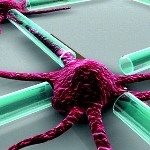Archive for Май, 2006
Wearable action-assist device, and method and program for controlling wearable action-assist device
- Тип контента: Патент
- Номер документа: 5035
- Название документа: Wearable action-assist device, and method and program for controlling wearable action-assist device
- Номер (DOI, IBSN, Патент): EP1661543A1
- Изобретатель/автор: Sankai, Y.
- Правопреемник/учебное заведение: Не заполнено
- Дата публикации документа: 2006-05-31
- Страна опубликовавшая документ: Япония
- Язык документа: Английский
- Наименование изделия: Не заполнено
- Источник: http://www.freepatentsonline.com/EP1661543.html
- Вложения: Да
- Аналитик: Дмитрий Соловьев
 A wearable action-assist device which assists or executes an action of a wearer by substituting for the wearer is provided with an action-assist tool 2 having an actuator 201 which gives power to the wearer 1, a biosignal sensor 221 which detects a wearer’s biosignal, a biosignal processing unit 3 which acquires from a biosignal «a» detected by the biosignal sensor a nerve transfer signal «b» for operating a wearer’s muscular line skeletal system, and a myoelectricity signal «c» accompanied with a wearer’s muscular line activity, an optional control unit 4 which generates a command signal «d» for causing the actuator 201 to generate power according to the wearer’s intention using the nerve transfer signal «b» and the myoelectricity signal «c» acquired by the biosignal processing unit 3, and a driving current generating unit 5 which generates a current according to the nerve transfer signal b and a current according to the myoelectricity signal «c», respectively, based on the command signal «d» generated by the optional control unit 4, and supplies the currents to the actuator 201.
A wearable action-assist device which assists or executes an action of a wearer by substituting for the wearer is provided with an action-assist tool 2 having an actuator 201 which gives power to the wearer 1, a biosignal sensor 221 which detects a wearer’s biosignal, a biosignal processing unit 3 which acquires from a biosignal «a» detected by the biosignal sensor a nerve transfer signal «b» for operating a wearer’s muscular line skeletal system, and a myoelectricity signal «c» accompanied with a wearer’s muscular line activity, an optional control unit 4 which generates a command signal «d» for causing the actuator 201 to generate power according to the wearer’s intention using the nerve transfer signal «b» and the myoelectricity signal «c» acquired by the biosignal processing unit 3, and a driving current generating unit 5 which generates a current according to the nerve transfer signal b and a current according to the myoelectricity signal «c», respectively, based on the command signal «d» generated by the optional control unit 4, and supplies the currents to the actuator 201.
Категория: Патенты | Нет комментариев »
Neuro-Fuzzy based Motion Control of a Robotic Exoskeleton: Considering End-effector Force Vectors
- Тип контента: Научная статья
- Номер документа: 7502
- Название документа: Neuro-Fuzzy based Motion Control of a Robotic Exoskeleton: Considering End-effector Force Vectors
- Номер (DOI, IBSN, Патент): Не заполнено
- Изобретатель/автор: Mohammad Habibur Rahman, Makoto Sasaki, Kazuo Kiguchi
- Правопреемник/учебное заведение: Graduate School of Science and Engineering, Department of Advanced Systems Control Engineering, Saga University, Saga
- Дата публикации документа: 2006-05-31
- Страна опубликовавшая документ: Япония
- Язык документа: Английский
- Наименование изделия: Не заполнено
- Источник: Proceedings of the 2006 IEEE International Conference on Rob
- Вложения: Да
- Аналитик: Глаголева Елена
 To assist physically disabled, injured, and/or elderly persons, we have been developing a 3DOF exoskeleton robot for assisting upper-limb motion, since upper-limb motion is involved in a lot of activities of everyday life. The exoskeleton robot is mainly is controlled by the skin surface electromyogram (EMG) signals, since EMG signals of muscles directly reflect how the user intends to move. This paper introduces the mechanism of the exoskeleton robot and also proposes a control method of the exoskeleton robot considering the generated end-effector force vectors.
To assist physically disabled, injured, and/or elderly persons, we have been developing a 3DOF exoskeleton robot for assisting upper-limb motion, since upper-limb motion is involved in a lot of activities of everyday life. The exoskeleton robot is mainly is controlled by the skin surface electromyogram (EMG) signals, since EMG signals of muscles directly reflect how the user intends to move. This paper introduces the mechanism of the exoskeleton robot and also proposes a control method of the exoskeleton robot considering the generated end-effector force vectors.
Категория: Научные статьи | Нет комментариев »
Нанотрубки связывают компьютер и нервные клетки.
- Тип контента: Новостная статья
- Номер документа: 4829
- Название документа: Нанотрубки связывают компьютер и нервные клетки
- Номер (DOI, IBSN, Патент): Не заполнено
- Изобретатель/автор: Не заполнено
- Правопреемник/учебное заведение: Не заполнено
- Дата публикации документа: 2006-05-12
- Страна опубликовавшая документ: Россия
- Язык документа: Русский
- Наименование изделия: Не заполнено
- Источник: http://www.3dnews.ru/news/nanotrubki_svyazivaut_komputer_i_n
- Вложения: Не заполнено
- Аналитик: Helix
 Мир во всю двигается в эпоху киберпанка, когда на смену обычным органам придут мощные глазные протезы с инфракрасными датчиками и камкордерами, а руки и ноги усилят экзоскелеты. Почти каждую неделю появляются сведения о том, что учёным удалось связать напрямую электронику и нервную клетку.
Мир во всю двигается в эпоху киберпанка, когда на смену обычным органам придут мощные глазные протезы с инфракрасными датчиками и камкордерами, а руки и ноги усилят экзоскелеты. Почти каждую неделю появляются сведения о том, что учёным удалось связать напрямую электронику и нервную клетку.
Категория: Управление | Нет комментариев »
Direct Biocontrol of Telemanipulators andVR Environments Using Semg and Intelligent Systems.
- Тип контента: Научная статья
- Номер документа: 9569
- Название документа: Direct Biocontrol of Telemanipulators andVR Environments Using Semg and Intelligent Systems.
- Номер (DOI, IBSN, Патент): Не заполнено
- Изобретатель/автор: Nikhil Shrirao
- Правопреемник/учебное заведение: The Graduate Faculty of the University of Akron
- Дата публикации документа: 2006-05-12
- Страна опубликовавшая документ: США
- Язык документа: Английский
- Наименование изделия: Не заполнено
- Источник: Не заполнено
- Вложения: Да
- Аналитик: Глаголева Елена
 Virtual Reality describes a 3-D computer generated environment, controlled by the user from a remote location. VR has applications in robotics, entertainment and medical field. Virtual Reality robotic systems have been a major help in hazardous environments and in areas which need a high degree precision such as nuclear plants and tele-surgery. An ideal VR system immerses the user in the virtual environment. This condition is termed as telepresence. The components of a VR system are human operator, interface system and teleoperator. VR system relies on human interface performance for its high accuracy. Commercially available interfaces such as Data Gloves and exoskeleton devices provide less accuracy and restricted motion. A biocontrol interface utilizing human physiological signals such as Electromyogram (EMG) would be a natural and synergistic way of controlling a remote teleoperator. Previous studies (Suryanarayan and Reddy) have shown that surface EMG (SEMG) from flexor muscle can be effectively used as a human interface for controlling teleoperators for dynamic motion of elbow joints. The goal of the present study was to investigate the use of SEMG from extensor muscle to control real time dynamic movement of index finger at various speeds for full range. Normal subjects were asked to rhythmically flex and extend the index finger at different speeds. The actual angle was measured using a miniature accelero-meter. SEMG from extensor muscle (Extensor Digitorum Superficialis (EDS)) was used to correlate with angle made by index finger at various speeds, with all other fingers at constant position. Parameters were extracted from SEMG. Neural networks were trained with input as extracted parameters and targets as measured angles. Best five networks were recruited for each committee. Two committees for each speed were formed. The committees were evaluated using data from new subject and the errors between actual and predicted joint angle was calculated. The committees were able to predict the joint angle at different speeds. The RMS errors between the predicted and the actual angle were found to be between 3-27%. The errors were more in the flexion region as compared to the extensor region. The study demonstrated the use of SEMG from EDS for the prediction of joint angle at different speeds. It also demonstrated the use of committee neural networks (CNN) in control related prediction problems. The study has taken a step forward in the direct biocontrol of telemanipulator and VR environments using SEMG. The study would find an application in medicine and control of robotic assist devices.
Virtual Reality describes a 3-D computer generated environment, controlled by the user from a remote location. VR has applications in robotics, entertainment and medical field. Virtual Reality robotic systems have been a major help in hazardous environments and in areas which need a high degree precision such as nuclear plants and tele-surgery. An ideal VR system immerses the user in the virtual environment. This condition is termed as telepresence. The components of a VR system are human operator, interface system and teleoperator. VR system relies on human interface performance for its high accuracy. Commercially available interfaces such as Data Gloves and exoskeleton devices provide less accuracy and restricted motion. A biocontrol interface utilizing human physiological signals such as Electromyogram (EMG) would be a natural and synergistic way of controlling a remote teleoperator. Previous studies (Suryanarayan and Reddy) have shown that surface EMG (SEMG) from flexor muscle can be effectively used as a human interface for controlling teleoperators for dynamic motion of elbow joints. The goal of the present study was to investigate the use of SEMG from extensor muscle to control real time dynamic movement of index finger at various speeds for full range. Normal subjects were asked to rhythmically flex and extend the index finger at different speeds. The actual angle was measured using a miniature accelero-meter. SEMG from extensor muscle (Extensor Digitorum Superficialis (EDS)) was used to correlate with angle made by index finger at various speeds, with all other fingers at constant position. Parameters were extracted from SEMG. Neural networks were trained with input as extracted parameters and targets as measured angles. Best five networks were recruited for each committee. Two committees for each speed were formed. The committees were evaluated using data from new subject and the errors between actual and predicted joint angle was calculated. The committees were able to predict the joint angle at different speeds. The RMS errors between the predicted and the actual angle were found to be between 3-27%. The errors were more in the flexion region as compared to the extensor region. The study demonstrated the use of SEMG from EDS for the prediction of joint angle at different speeds. It also demonstrated the use of committee neural networks (CNN) in control related prediction problems. The study has taken a step forward in the direct biocontrol of telemanipulator and VR environments using SEMG. The study would find an application in medicine and control of robotic assist devices.
Категория: Научные статьи | Нет комментариев »
An Ankle-Foot Emulation System for the Study of Human Walking Biomechanics
- Тип контента: Научная статья
- Номер документа: 6674
- Название документа: An Ankle-Foot Emulation System for the Study of Human Walking Biomechanics
- Номер (DOI, IBSN, Патент): Не заполнено
- Изобретатель/автор: Samuel K. Au, Peter Dilworth, Hugh Herr
- Правопреемник/учебное заведение: Massachusetts Institute of Technology Cambridge
- Дата публикации документа: 2006-05-11
- Страна опубликовавшая документ: США
- Язык документа: Английский
- Наименование изделия: Не заполнено
- Источник: Proceedings of the 2006 IEEE International Conference on Rob
- Вложения: Да
- Аналитик: Глаголева Елена
 Although below-knee prostheses have been commercially available for some time, today’s devices are completely passive, and consequently, their mechanical properties remain fixed with walking speed and terrain. A lack of understanding of the ankle-foot biomechanics and the dynamic interaction between an amputee and a prosthesis is one of the main obstacles in the development of a biomimetic ankle-foot prosthesis. In this paper, we present a novel ankle-foot emulator system for the study of human walking biomechanics. The emulator system is comprised of a high performance, force-сontrol-lable, robotic anklefoot worn by an amputee interfaced to a mobile computing unit secured around his waist. We show that the system is capable of mimicking normal ankle-foot walking behaviour. An initial pilot study supports the hypothesis that the emulator may provide a more natural gait than a conventional passive prosthesis.
Although below-knee prostheses have been commercially available for some time, today’s devices are completely passive, and consequently, their mechanical properties remain fixed with walking speed and terrain. A lack of understanding of the ankle-foot biomechanics and the dynamic interaction between an amputee and a prosthesis is one of the main obstacles in the development of a biomimetic ankle-foot prosthesis. In this paper, we present a novel ankle-foot emulator system for the study of human walking biomechanics. The emulator system is comprised of a high performance, force-сontrol-lable, robotic anklefoot worn by an amputee interfaced to a mobile computing unit secured around his waist. We show that the system is capable of mimicking normal ankle-foot walking behaviour. An initial pilot study supports the hypothesis that the emulator may provide a more natural gait than a conventional passive prosthesis.
Категория: Научные статьи | Нет комментариев »
Статистика
Категорий: 179
Статей всего: 2,003
По типу:
Видео: 36
Выдержка с форума: 1
Контактные данные: 12
Научная статья: 1388
Не заполнено: 5
Новостная статья: 317
Обзор технологии: 42
Патент: 219
Тех.подробности: 34
Тип: 1
Комментариев: 9,908
Изображений: 3,005
Подробней...
ТОР 10 аналитиков
-
Глаголева Елена - 591
Дмитрий Соловьев - 459
Helix - 218
Ридна Украина))) - 85
Наталья Черкасова - 81
max-orduan - 29
Елена Токай - 15
Роман Михайлов - 9
Мансур Жигануров - 4
Дуванова Татьяна - 3
Календарь
Авторизация
Ошибка в тексте?
Выдели её мышкой!
И нажми Ctrl+Enter